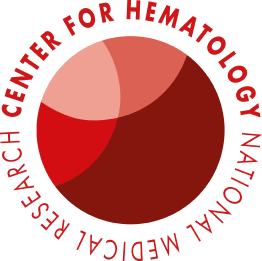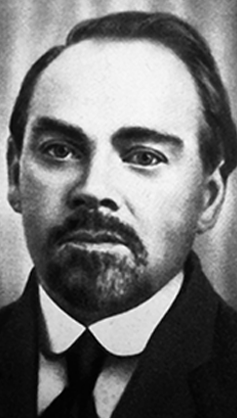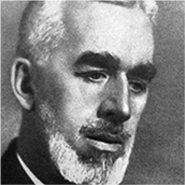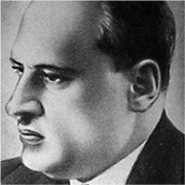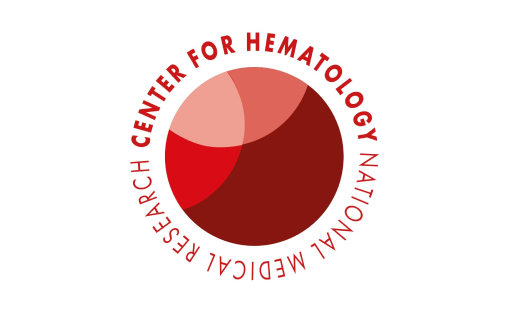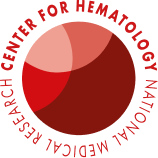- Official Information
Official Information
- A Word from Our Director
- About the NMRC for Hematology
- Structure
- Administration
- Departments
- History
History
- Our History
- All Directors of the NMRC for Hematology
All Directors of the NMRC for Hematology
- Our Awards
- Printed Publications of the NMRC for Hematology
- Gallery
- News
- Reviews
- Press Office
- Useful Resources
- Medical Tourism
- Consultative Doctors
- Clinical Departments
- Our Doctors
- Price List for Paid Medical Services
- High-tech Medical Care
- Preparation for Diagnostic Tests
Preparation for Diagnostic Tests
- Preparation instructions for a rectoromanoscopy
- Preparation instructions for low-dose computed tomography (CT) of skeletal bones without bolus contrast enhancement
- Preparation instructions for computed tomography (CT) of the thoracic cavity, brain, paranasal sinuses, orbits, osteoarticular apparatus, soft tissues of the neck without bolus contrast enhancement
- Preparation instructions for magnetic resonance imaging (MRI)
- Preparation instructions for a colonoscopy
- Indications for ultrasound examination of veins and arteries
- Preparation instructions for an excretory urography
- Preparation instructions for computed tomography (CT) of the thoracic cavity, brain, urinary system, vessels of the head and neck, aortography with bolus contrast enhancement
- Preparation instructions for computed tomography (CT) of the abdominal and pelvic organs with and without bolus contrast enhancement
- Preparation instructions for an esophagogastroduodenoscopy (EGD), bronchoscopy, laryngoscopy
- Preparation instructions for an ultrasound examination of the abdominal organs
- Indications and contraindications for echocardiography (ECHO-KG)
- Patient Stories
- Procedure for Issuing Medical Documentation
- Internal Regulations for Patients and Other Visitors
- Rules for Visiting Hospital Patients
- About
About
- Official Information
Official Information
- A Word from Our Director
- About the NMRC for Hematology
- Structure
- Administration
- Departments
- History
History
- Our History
- All Directors of the NMRC for Hematology
All Directors of the NMRC for Hematology
- Our Awards
- Printed Publications of the NMRC for Hematology
- Gallery
- News
- Reviews
- Press Office
- Useful Resources
- Patients
Patients- Medical Tourism
- Consultative Doctors
- Clinical Departments
- Our Doctors
- Price List for Paid Medical Services
- High-tech Medical Care
- Preparation for Diagnostic Tests
Preparation for Diagnostic Tests
- Preparation instructions for a rectoromanoscopy
- Preparation instructions for low-dose computed tomography (CT) of skeletal bones without bolus contrast enhancement
- Preparation instructions for computed tomography (CT) of the thoracic cavity, brain, paranasal sinuses, orbits, osteoarticular apparatus, soft tissues of the neck without bolus contrast enhancement
- Preparation instructions for magnetic resonance imaging (MRI)
- Preparation instructions for a colonoscopy
- Indications for ultrasound examination of veins and arteries
- Preparation instructions for an excretory urography
- Preparation instructions for computed tomography (CT) of the thoracic cavity, brain, urinary system, vessels of the head and neck, aortography with bolus contrast enhancement
- Preparation instructions for computed tomography (CT) of the abdominal and pelvic organs with and without bolus contrast enhancement
- Preparation instructions for an esophagogastroduodenoscopy (EGD), bronchoscopy, laryngoscopy
- Preparation instructions for an ultrasound examination of the abdominal organs
- Indications and contraindications for echocardiography (ECHO-KG)
- Patient Stories
- Procedure for Issuing Medical Documentation
- Internal Regulations for Patients and Other Visitors
- Rules for Visiting Hospital Patients
- Science
- Home
- About
About the NMRC for Hematology- Organization for the strategic development of Russian healthcare in hematology, transfusiology and oncology
- Center for interregional cooperation
 General Director, Corresponding Member of the Russian Academy of Sciences, Doctor of Medical Sciences, Chief Freelance Specialist Hematologist of the Ministry of Health of RussiaReception: +7 (495) 612-21-23Fax: +7 (495) 612-42-52E-mail: director@blood.ru
General Director, Corresponding Member of the Russian Academy of Sciences, Doctor of Medical Sciences, Chief Freelance Specialist Hematologist of the Ministry of Health of RussiaReception: +7 (495) 612-21-23Fax: +7 (495) 612-42-52E-mail: director@blood.ru First Deputy General Director, Chief Freelance Specialist Transfusiologist of the Ministry of Health of Russia, Doctor of Medical SciencesReception: +7 (495) 613-87-30E-mail: director@blood.ru
First Deputy General Director, Chief Freelance Specialist Transfusiologist of the Ministry of Health of Russia, Doctor of Medical SciencesReception: +7 (495) 613-87-30E-mail: director@blood.ru Wednesdays from 16:00 to 18:00
Wednesdays from 16:00 to 18:00 First Deputy General Director, Chief Freelance Specialist Hematologist of the Ministry of Health of Russia for the Central Federal District, Candidate of Medical SciencesReception: +7 (495) 612-63-91E-mail: director@blood.ru
First Deputy General Director, Chief Freelance Specialist Hematologist of the Ministry of Health of Russia for the Central Federal District, Candidate of Medical SciencesReception: +7 (495) 612-63-91E-mail: director@blood.ru Wednesdays from 16:00 to 18:00
Wednesdays from 16:00 to 18:00 Hunan L. JulhakyanScientific Secretary, Candidate of Medical Sciences
Hunan L. JulhakyanScientific Secretary, Candidate of Medical Sciences Tatiana V. IvanovaDeputy Chief Physician for Clinical and Expert Work, Candidate of Medical Sciences
Tatiana V. IvanovaDeputy Chief Physician for Clinical and Expert Work, Candidate of Medical Sciences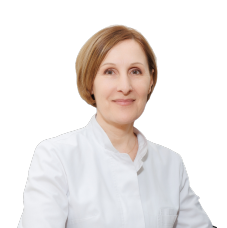 Deputy Head Physician for Laboratory Work, Candidate of Medical Sciences
Deputy Head Physician for Laboratory Work, Candidate of Medical Sciences Galina A. RachkovaChief Medical Nurse
Galina A. RachkovaChief Medical Nurse Andrey N. MamaevDirector of the Altai Branch of the NMRC for Hematology, Doctor of Medical SciencesReception: +7 (3852) 689-800656024 Barnaul, Lyapidevsky St., 1
Andrey N. MamaevDirector of the Altai Branch of the NMRC for Hematology, Doctor of Medical SciencesReception: +7 (3852) 689-800656024 Barnaul, Lyapidevsky St., 1 Igor A. OlkhovskiyDirector of the Krasnoyarsk Branch of the NMRC for Hematology, Candidate of Medical SciencesReception: +7 (391) 290-55-13E-mail: krashemcenter@mail.ru660036, Krasnoyarsk, Akademgorodok, 15а
Igor A. OlkhovskiyDirector of the Krasnoyarsk Branch of the NMRC for Hematology, Candidate of Medical SciencesReception: +7 (391) 290-55-13E-mail: krashemcenter@mail.ru660036, Krasnoyarsk, Akademgorodok, 15а Department of Surgery
Department of Surgery Department of Hematology and Chemotherapy of Orphan Diseases
Department of Hematology and Chemotherapy of Orphan Diseases Hematology Day Hospital for Patients with Hereditary Metabolic Diseases
Hematology Day Hospital for Patients with Hereditary Metabolic Diseases Division of Microbiology and Antimicrobial Therapy
Division of Microbiology and Antimicrobial Therapy Department of Traumatology and Reconstructive Orthopedics for Patients with Hemophilia
Department of Traumatology and Reconstructive Orthopedics for Patients with Hemophilia Laboratory for the Study of Mental and Neurological Disorders in Diseases of the Blood System
Laboratory for the Study of Mental and Neurological Disorders in Diseases of the Blood System Office of Endoscopy
Office of Endoscopy Department of Radiology
Department of Radiology Office of Magnetic Resonance Imaging
Office of Magnetic Resonance Imaging Laboratory of Karyology
Laboratory of Karyology Department of Pathology
Department of Pathology Laboratory for Immunophenotyping Blood and Bone Marrow CellsDepartment of Surgery
Laboratory for Immunophenotyping Blood and Bone Marrow CellsDepartment of Surgery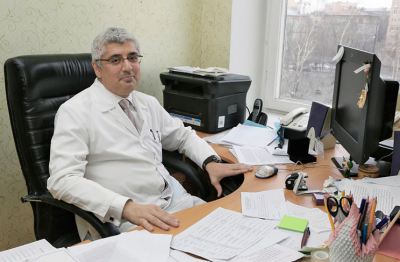
The head of the department is Karen I . Danishyan , Doctor of Medical Sciences, surgeon.
Since 2012, the department has been headed by Doctor of Medical Sciences, Karen I. Danishyan.
The department’s main areas of work include:
- minimally invasive therapeutic and diagnostic interventions in patients with pathology of the blood system
- endoscopic diagnosis of specific lesions of the mediastinum, lungs and abdominal organs in hematological patients
- diagnostics and surgical tactics for urgent diseases of the abdominal cavity in hematology practice
The department is deployed for 40 beds. The patient population is very diverse. These are patients with diseases of the blood system requiring splenectomy, as well as patients with a general surgical profile. Hematological patients are admitted to the department on referral from the outpatient and hematological departments of the NMRC for Hematology, the hematological departments of Moscow city hospitals, and regional and republican hematological centers. Patients with a general surgical profile are referred by the district polyclinics of the city, medical units, therapeutic departments of Moscow city hospitals, anti- tuberculosis dispensaries, district oncologists, as well as by referral from the Ministry of Health of the Russian Federation.
Department of Hematology and Chemotherapy of Orphan Diseases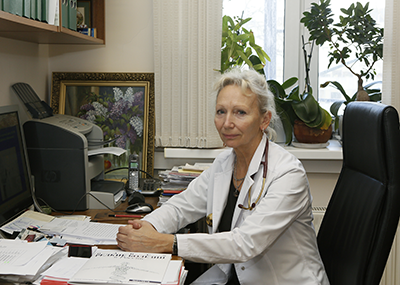
The head of the department is hematologist, Elena A. Lukina,Doctor of Medical Sciences, professor, hematologist of the highest category, expert of the Ministry of Health of Russia, Roszdravnadzor and the Russian Academy of Sciences, member of the Expert Council on Rare Diseases of the Committee on Health Protection of the State Duma of the Russian Federation.
The list of diseases and syndromes with which adult patients are referred for examination and treatment to the department:
- Gaucher disease and other lysosomal storage diseases
- hereditary hemolytic anemia, including beta-thalassemia
- autoimmune hemolytic anemia
- paroxysmal nocturnal hemoglobinuria
- hereditary and acquired hemochromatosis;
- xtrahepatic portal hypertension as a result of portal system thrombosis
- histiocytosis from Langerhans cells and other rare forms of macrophage/histiocyte diseases (xantogranuloma, Erdheim-Chester disease)
- acute porphyrias
- systemic mastocytosis
- secondary cytopenia associated with liver pathology
- immune thrombocytopenia, resistant forms
Hematology Day Hospital for Patients with Hereditary Metabolic Diseases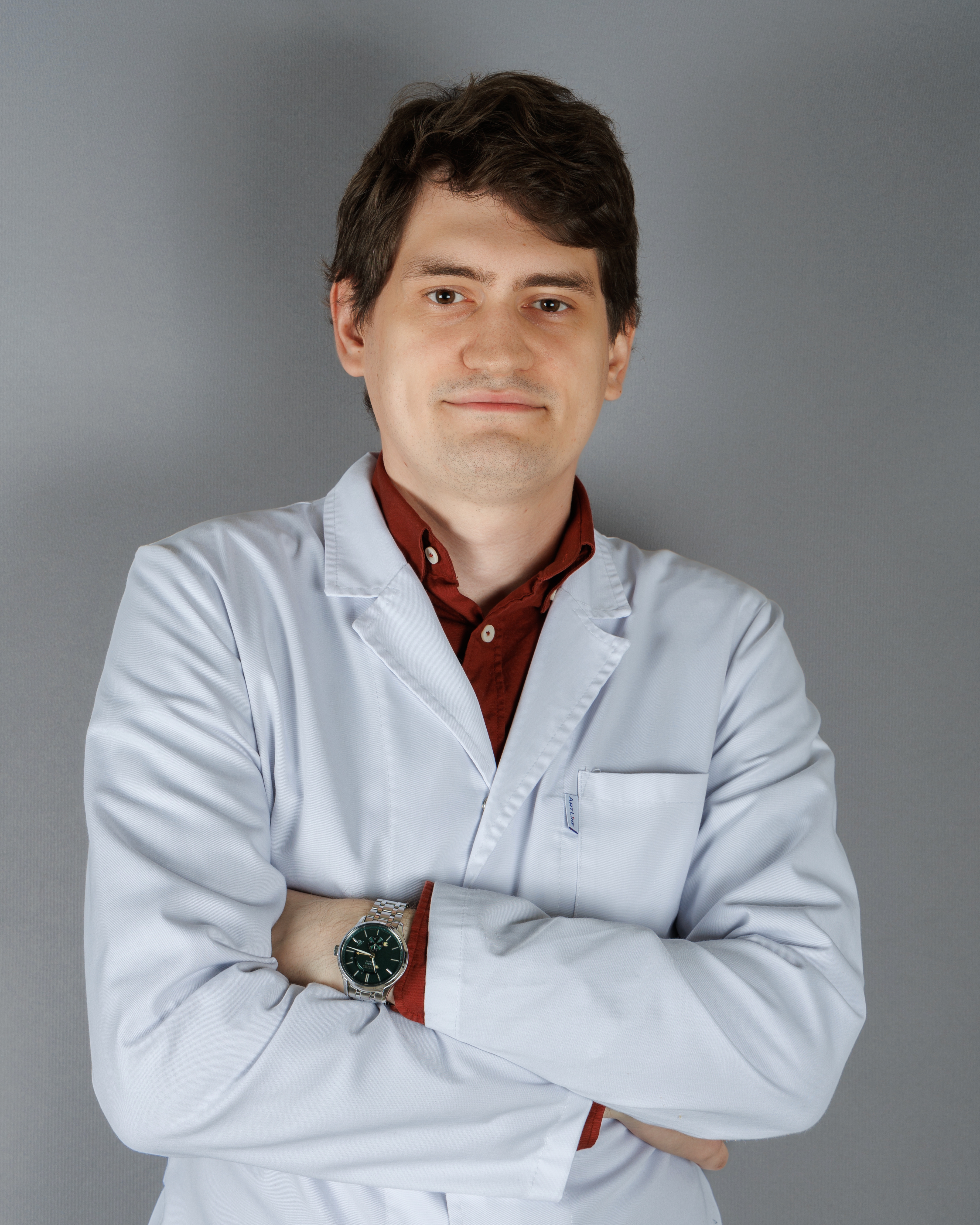
The head of the day hospital is hematologist, Vitaly D. Latyshev.
The department was established in April 2022 and functions as part of the Division of Orphan Diseases. The main focus of work is the diagnosis and treatment of congenital and acquired non-tumor pathology of the blood system, rare diseases.
The department performs diagnostics and treatment of diseases such as:
- hereditary hemolytic anemia (including beta-thalassemia, sickle cell anemia and other congenital hemoglobinopathies and membranopathies);
- autoimmune hemolytic anemia;
- paroxysmal nocturnal hemoglobinuria;
- hereditary and acquired hemochromatoses;
- histiocytosis from Langerhans cells and other rare histiocytoses (xanthogranuloma, Erdheim—Chester disease);
- systemic mastocytosis;
- congenital and acquired cytopenic syndromes;
- immune thrombocytopenia (resistant forms).
Close interaction with the round-the-clock hospital of the Department of Orphan Diseases allows us to maintain continuity in therapy and subsequent dispensary observation of patients after the inpatient treatment stage. The main focus of the department is to improve the methods of diagnosis and treatment of non-tumor diseases of the blood system, as well as the introduction of new treatment methods into clinical practice. The department conducts Russian and international clinical trials of new drugs and methods of treatment of patients with orphan diseases.
Division of Microbiology and Antimicrobial Therapy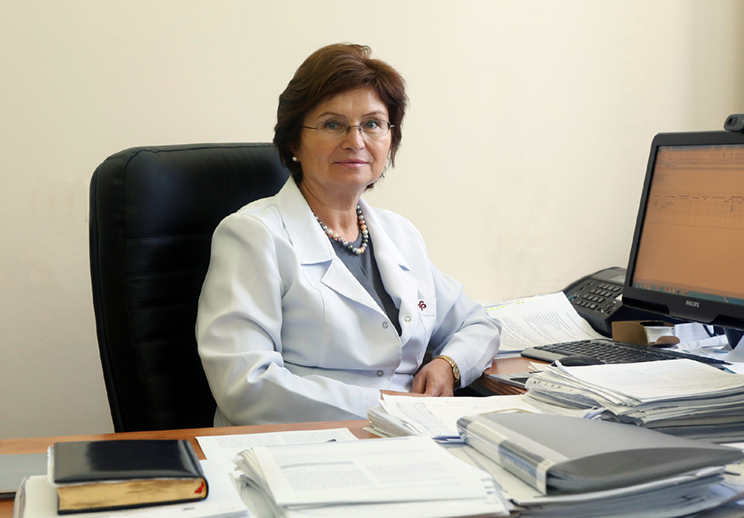
Galina A. Klyasova, Professor, Doctor of Medical Sciences
The division includes:
The division was established in 2000 as the Laboratory of Clinical Bacteriology, Mycology and Antibiotic Therapy. The main goal of the division is the diagnosis of bacterial and fungal infections.
Scientific and clinical work is carried out in several areas:
Department of Traumatology and Reconstructive Orthopedics for Patients with Hemophilia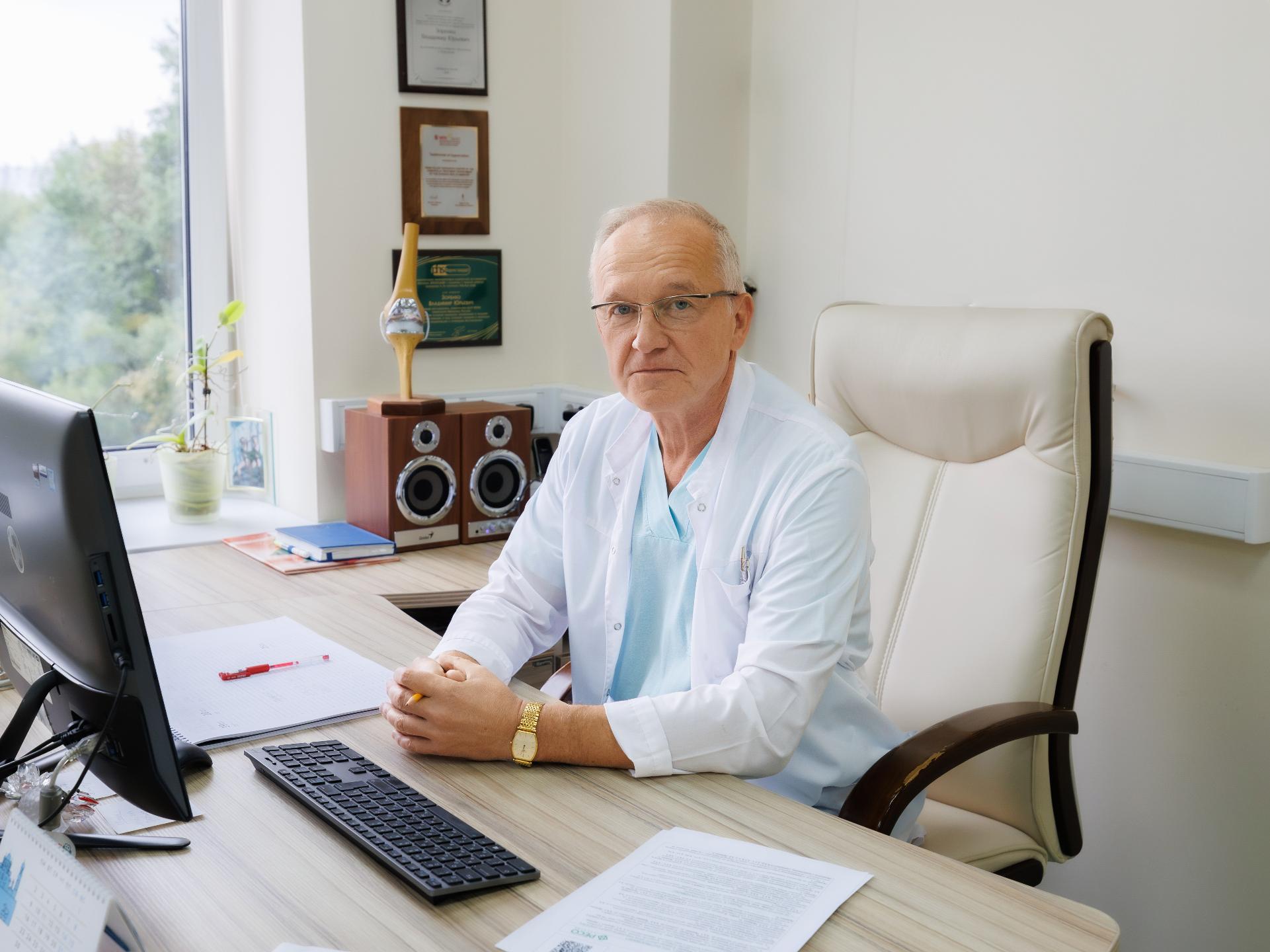
Head of the department- orthopedic traumatologist, Vladimir Y. Zorenko, Doctor of Medical Sciences.
In 1988, Professor Y.N. Andreev, an honored scientist, established a reconstructive and restorative Department of Orthopedics at the Institute. Under the leadership of Y.N. Andreev (from 1988 to 2005), a highly professional school of surgeons was formed, which substantiated the most important provisions of hematological traumatology and orthopedics. For the first time in our country, surgeries for prosthetics of large joints began to be performed in patients with hemophilia and other blood clotting diseases.
In 2009, Doctor of Medical Sciences, Professor, doctor of the highest category, Vladimir Y. Zorenko, became head of the department.
Since 1995, the department has regularly conducted clinical trials of drugs used to treat hemophilia and other coagulopathies.
Laboratory for the Study of Mental and Neurological Disorders in Diseases of the Blood System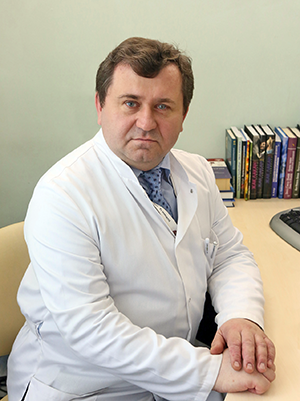
The head of the laboratory is psychiatrist, Dmitry E. Vybornykh, Doctor of Medical Sciences.
Since 2000, the NMRC for Hematology has been actively working on the study of mental disorders in patients of the Center, both in the study of diseases associated with the somatogenic or nosogenic influence of hematological pathology, and those unrelated to it, as well as the development of therapeutic methods for such disorders. Representatives of the Center participate in domestic and foreign conferences devoted to the issues of psycho- oncology and psycho-hematology and regularly publish papers in domestic and foreign publications.
In 2012, the NMRC for Hematology created a special group for the study of mental disorders in diseases of the blood system. This group was reorganized in 2016 into the Laboratory for the Study of Mental and Neurological Disorders in Diseases of the Blood System. The laboratory is designed to conduct systematic research in this area, which is of great scientific and applied importance.
Among the main research areas of the department:
Office of Endoscopy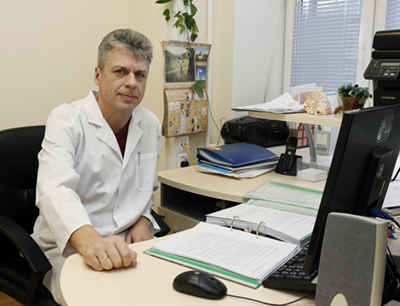
Head of the office- endoscopist, Vladimir A. Makhinya
The office is part of the Department of Endoscopy and Office of Ultrasound and Functional Diagnostics.
In the 1970s, an endoscopic service was organized as a part of the Department of Surgery under the leadership of Prof. V.A. Klimansky. At that time, doctors like I.A. Zagrekov, V.S. Shavlokhov and A.V. Tochenov actively worked on mastering this new method for the whole of the country. Since 2002, with the arrival of doctors V.A. Makhinya and O.Y. Popova, the number of endoscopic examinations have increased significantly. In 2011, the endoscopic service became the Department of Endoscopy and in 2022, the Department of Endoscopy was transformed into the Department of Endoscopy & Office of Ultrasound and Functional Diagnostics.
In close cooperation with the Intensive Care Unit, under the leadership of G.M. Galstyan, methods of performing bronchoalveolar lavages were developed and improved, the technique of installing percutaneous endoscopic gastrostomy and the technique of installing tracheostomy by puncture dilation method were mastered. Currently, the department is equipped with modern digital equipment with high resolution (HD quality), the latest generation mounts, an electrosurgical unit, and an argonoplasmic coagulation apparatus, which allows for a wide range of diagnostic and therapeutic capabilities of the department, as well as the possibility of surgical endoscopy.
Department of Radiology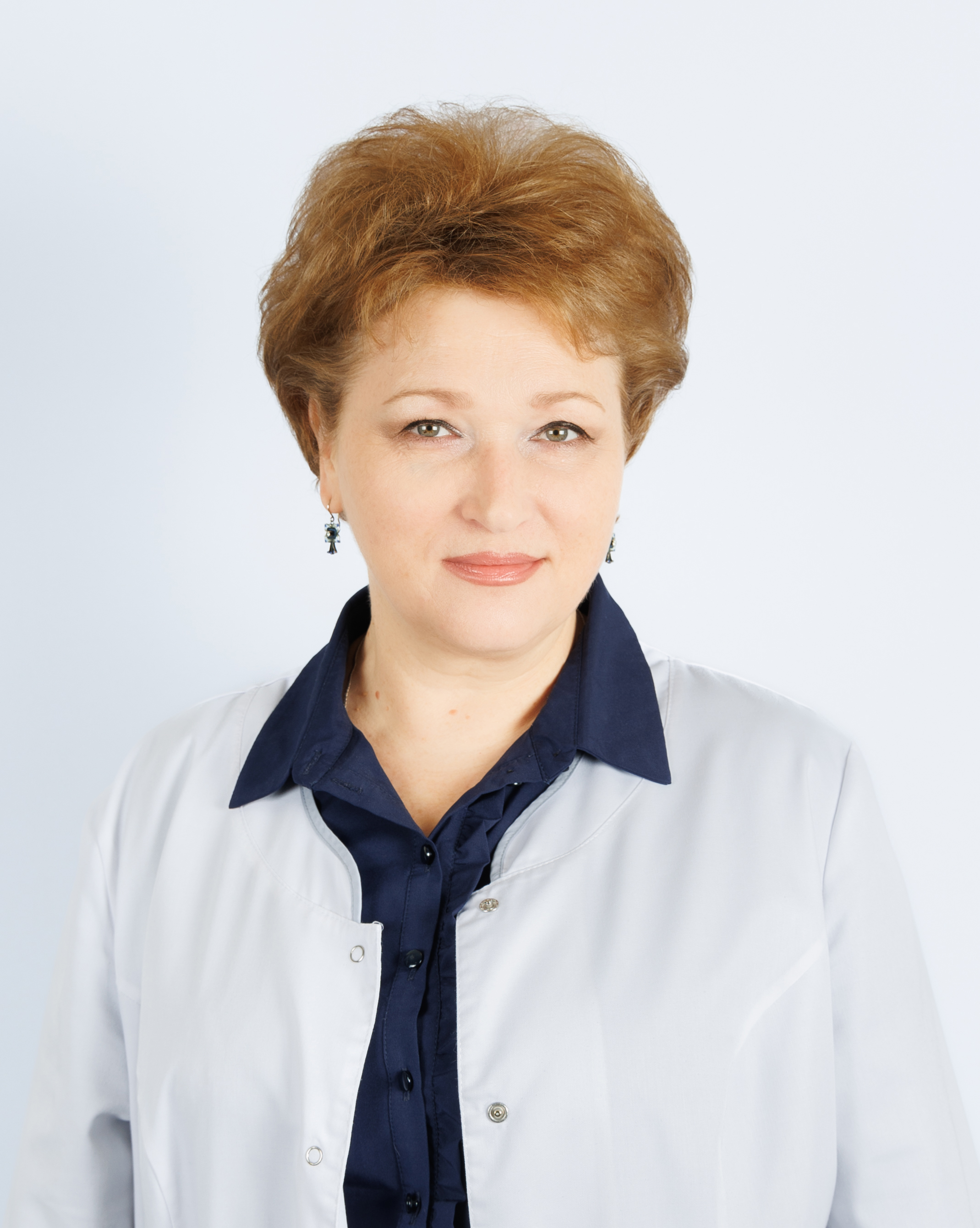
Head of the department- radiologist, Irina E. Kostina, Candidate of Medical Sciences
The department includes:
The department was formed in 2022 by combining Department of Radiology and Computed Tomography and the Department of Magnetic Resonance Imaging and Ultrasound Diagnostics.
The Department of Radiology at the NMRC for Hematology has been in existence since 1946. The first head of the department was Professor, Ella Novikova, who studied the features of radiological manifestations of pathology of bones and chest organs in blood diseases compared to the pathomorphological picture. From 1988 to 2012, the department was headed by Doctor of Medical Sciences, Lev N. Gotman, who developed a technique for angiographic embolization of the arteries of the spleen in hemoblastosis. During the period of his leadership, the department was re-equipped with modern X-ray diagnostic equipment, computer tomography and magnetic resonance imaging rooms, and a remote gamma therapy room. Since 2012, the department has been headed by Candidate of Medical Sciences, Irina E. Kostina.
Office of Magnetic Resonance Imaging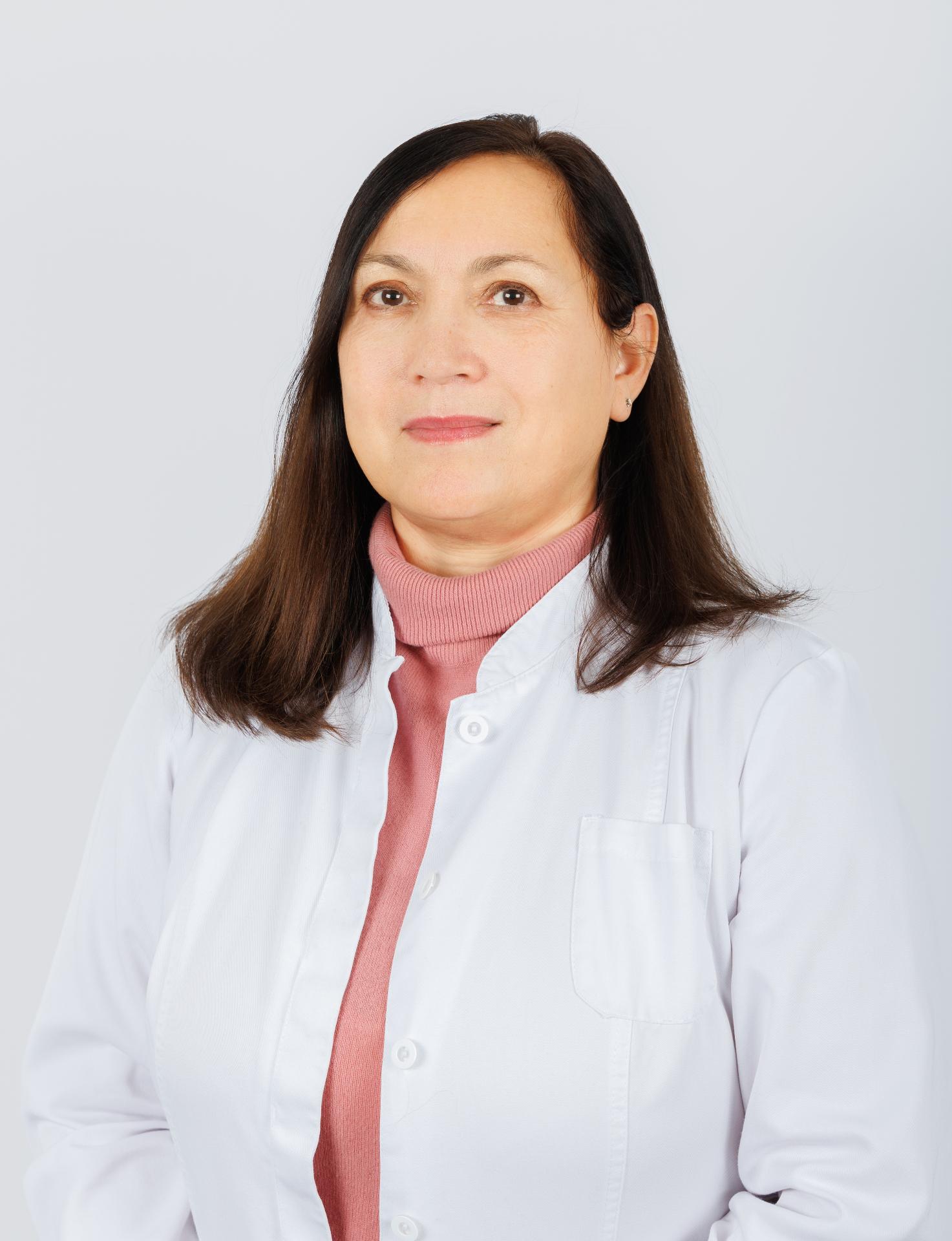
The head of the office is Galina A. Yatsyk, radiologist, Candidate of Medical Sciences, member of the ESR, MRB RSR (Moscow Regional Branch of the Russian Society of Radiologists) , RSR (Russian Society of Radiology)
The office functions as part of the Department of Radiology.
The office was transformed from the Department of Magnetic Resonance Imaging and Ultrasound Diagnostics established on August 1, 2013, and since 2022 has been a part of the Department of Radiology.
The office carries out examinations of patients with hemoblastosis, hematopoiesis pathology, and orphan diseases. The whole range of standard studies and developed examination protocols in the NMRC for Hematology are performed by the office. MRI studies of the whole body, according to protocols to exclude hemoblastosis, to quantify iron overload of parenchymal organs, in Gaucher's disease, and abdominal organs with intravenous bolus contrast enhancement, including primovist are carried out. Office employees participate in the performance of state tasks and scientific activities and are experienced at operating modern equipment: Philips Ingenia magnetic resonance tomograph with 1.5 tesla magnetic field induction.
Laboratory of Karyology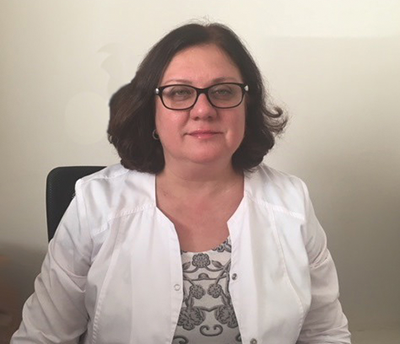
Head of the laboratory- doctor/aboratory geneticist, Tatiana N. Obukhova, Candidate of Medical Sciences
The Laboratory of Karyology was established at the Hematological Research Center of the Russian Academy of Medical Sciences, headed by Academician Andrei I. Vorobyov in 1988 for the practical implementation of cytogenetic research methods in clinical hematological practice, first on the scale of what is now the NMRC for Hematology, and then throughout the country. The ideological inspirer for the organization of the laboratory was the outstanding Russian hematologist Marina Davydovna Brilliant. The first head of the laboratory (1988- 2013) was Professor Elena V. Domracheva. Since 2013, the laboratory has been headed by T.N. Obukhova.
The main focus of the Laboratory of Karyology is the study of the genetic structure of tumor diseases of the blood system - the determination of the main molecular cytogenetic events underlying the initiation and progression of tumors as well as the development and improvement of methods for the molecular cytogenetic diagnosis of leukemia and lymphomas with the goal of identifying diagnostic chromosomal markers and cytogenetic disease prognosis factors for the selection of differentiated therapy and evaluation of the treatment effectiveness.
The laboratory specializes in cytogenetic and molecular-cytogenetic diagnostics of acute leukemia, myelodysplastic syndromes, chronic myeloid leukemia and other myeloproliferative diseases, chronic lymphocytic leukemia, lymphomas, multiple myeloma, and myeloid and lymphatic tumors occurring with eosinophilia. In methods of standard cytogenetic study (karyotyping) and molecular cytogenetic study (fluorescent in situ hybridization - FISH) of bone marrow cells and peripheral blood, tumor biopsy specimens are used. FISH is also performed on archival material: paraffin blocks and biopsy prints, bone marrow and blood smears. In addition, high-resolution methods for identifying complex structural rearrangements with multicolored coloration of chromosomes are used - M-FISH and M-BAND. For patients with aplastic anemia, myelodysplastic syndromes and acute leukemias, a diepoxybutane test (DEB test) to detect chromosomal instability and Fanconi anemia is performed. In the framework of scientific research, a modern high-resolution molecular-cytogenetic method is used – comparative genomic hybridization on DNA microarrays (comparative genomic hybridization, array CGH) in order to identify hidden chromosomal aberrations and determine prognostically significant markers of onco-hematological diseases.
Department of Pathology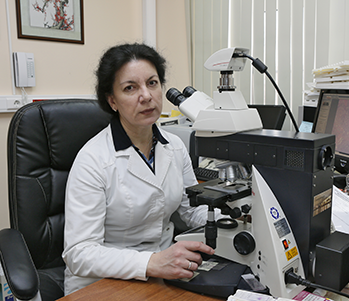
The head of the department is pathologist Alla M. Kovrigina, Doctor of Biological Sciences
The main areas of work of the Department of Pathology are the diagnosis of tumor and non- tumor diseases of lymphoid tissue and the blood system based on the study of bone marrow trephine biopsies and biopsy material of the lymph nodes, obligate hematopoietic organs, and lymphoid tissues of other localizations using histological, histochemical, immunohistochemical, in situ hybridization research methods. The department performs the functions of the Reference Center of the Ministry of Health of the Russian Federation in the field of hematology and conducts a large amount of consultative diagnostic work on the study of biopsy material (paraffin blocks, finished preparations and biopsy/surgical material sent in 10% neutral formalin) from various cities, regions of the Russian Federation, and a number of CIS republics.
Research is carried out on the material of bone marrow trephine biopsies, biopsy material obtained from cor-biopsies, excisional and incisional biopsies of the lymph nodes, endoscopic studies (including thoracoscopy, laparoscopy), and surgical material, in particular, thoracotomies, laparotomies and splenectomies. The department provides intraoperative (urgent) histological diagnostics for biopsies of neoplasms of retroperitoneal localization, mediastinum, lungs, and lymph nodes.
The development of criteria for the complex differential diagnosis of B- and T-lymphomas, Hodgkin's lymphoma, Ph-negative myeloproliferative diseases, myelodysplastic syndromes, and hypoplastic conditions of the hematopoietic tissue are priority scientific areas for the Department of Pathology.
Laboratory for Immunophenotyping Blood and Bone Marrow Cells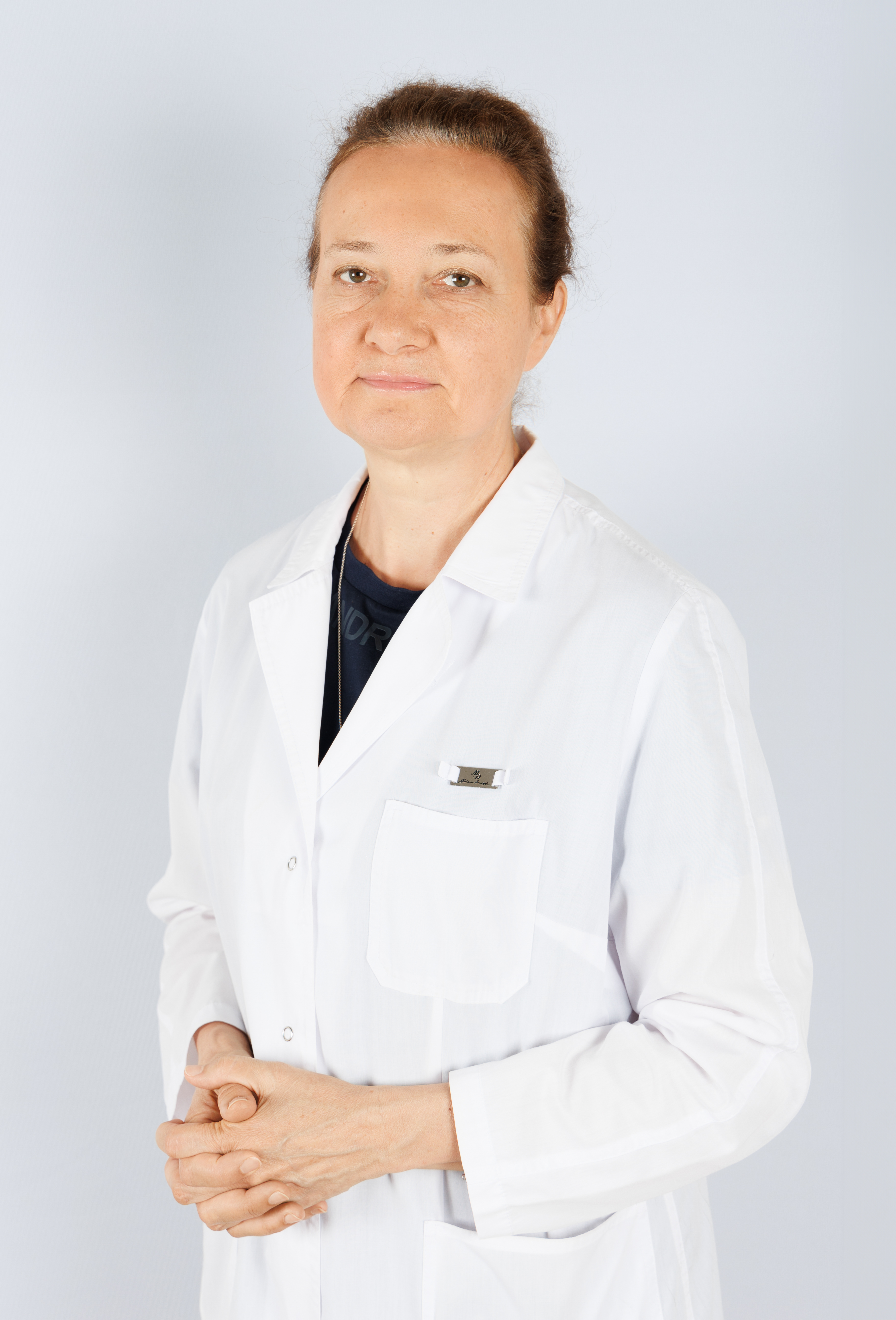
Head of the laboratory - hematologist Irina V. Galtseva, Candidate of Medical Sciences.
The laboratory was organized on March 1, 2013
Immunophenotyping of cells, carried out using flow cytometry, is widely used in clinical diagnostic and scientific research. A distinctive feature of this analysis is the ability to determine the phenotype of single cells. The method is based on the use of monoclonal antibodies to differentiation antigens, the combination of which makes it possible to detect various cell populations. The collection of antigens on the cell surface is called an immunophenotype. Over the past 20 years, flow cytometry has become an integral tool in the diagnosis of various hematological diseases, in particular lymphomas, leukemias, plasma cell neoplastic diseases, paroxysmal nocturnal hemoglobinuria (APG), etc. Based on the data on the immunophenotype and the analysis of a large number of cells, flow cytometry makes it possible to find extremely rare cell subpopulations.
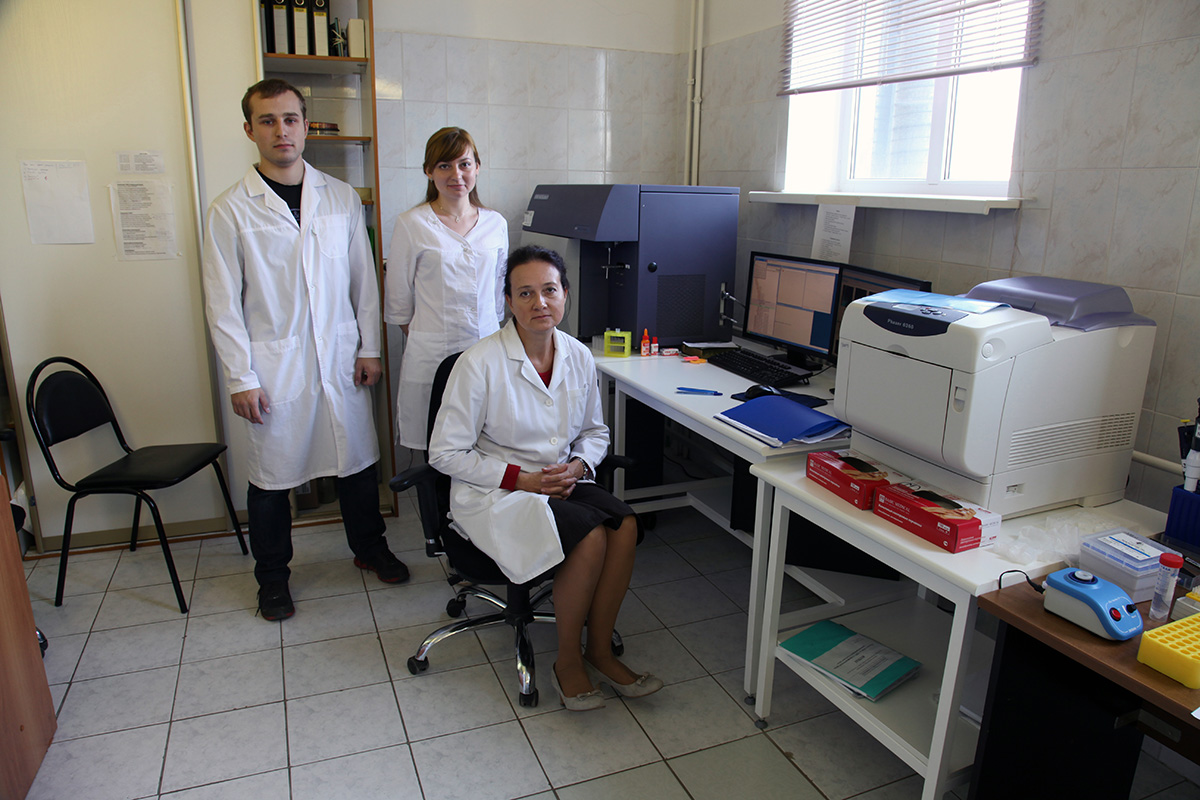 More Information
More InformationThe decision to establish the Institute of Blood Transfusion was made by the USSR Labor and Defense Council on February 26, 1926. Specialized institutions of a similar profile did not exist at that time, not only in the USSR, but also in the rest of the world.
The organizer of this institute was an outstanding figure of the era. He was a versatile, educated, and gifted man: doctor, economist, naturalist, revolutionary, and science fiction writer, Alexander Alexandrovich Bogdanov (Malinovsky) .
In those years, the work of the Institute was organized by famous domestic scientists and doctors: S.L. Maloletkov, I.I. Sobolev, D.A. Gudim-Levkovich, H.H. Vlados, M.P. Konchalovsky.
They set the foundations of modern production and clinical transfusion (rules for blood preparation, examination of donors, production of group sera, indications for blood transfusion).
All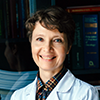 Elena N. ParovichnikovaHeading the NMRC for Hematology since 2021
Elena N. ParovichnikovaHeading the NMRC for Hematology since 2021Doctor of Medical Sciences, labor veteran, Honored Healthcare Worker of the Russian Federation, Excellent Healthcare Worker, chief freelance specialist hematologist of the Russian Ministry of Health. A leading specialist in the field of clinical and experimental hematology and hematopoietic cell transplantation. Coordinator of the Russian Research Group of Hematology Centers, initiator and coordinator of a multicenter study on the treatment of acute leukemia.
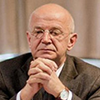 Valeriy G. SavchenkoHeaded the Center: 2011- 2021
Valeriy G. SavchenkoHeaded the Center: 2011- 202108.01.1952—25.07.2021. Academician of the Russian Academy of Medical Sciences, Doctor of Medical Sciences, Professor, Honored Health Worker of the Russian Federation, recipient of theExcellence in Health Care award. Chief Freelance Specialist hematologist of the Ministry of Health of Russia, President of the National Hematological Society, member of the American Association of Hematologists, organizer and chairman of the organizing committee of the International Hematological School, “Leukemia and Lymphoma. Therapy and Basic Research,” member of the International Committee of the Association for Comparative Research in Leukemia, Editor-in-Chief of the journal, “Hematology and Transfusiology,” leader of the development of diagnostic algorithms and protocols for the treatment of diseases in the blood system.
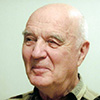 Andrey I. VorobyovHeaded the Institute: 1987 to 2011
Andrey I. VorobyovHeaded the Institute: 1987 to 201101.11.1928—15.06.2020. Academician of the Russian Academy of Medical Sciences and the Russian Academy of Sciences, Doctor of Medical Sciences, Professor. He gave a classical description of the pathogenesis of radiation sickness, created the world’s first only integrated system of biological dosimetry, which had a strong impact on the elimination of the consequences of the accident at the Chernobyl nuclear power plant.
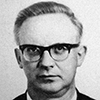 Anatoly G. FedotenkovHeaded the Institute: 1982 to 1987
Anatoly G. FedotenkovHeaded the Institute: 1982 to 19871919—1991. Transfusiologist, cryobiologist, health care organizer, Doctor of Medical Sciences (1967), Professor (1981), Honored Scientist of the RSFSR. He was one of the first in the USSR to elaborate on problem of tissue preservation.
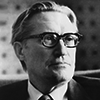 Oleg K. GavrilovHeaded the Institute: 1972 to 1982
Oleg K. GavrilovHeaded the Institute: 1972 to 198201.01.1922—03.10.2008. Academician of the Russian Academy of Medical Sciences, Doctor of Medical Sciences, professor. He is the creator of the doctrine of the aggregate state of blood. Under his leadership a new direction in the science of blood was developed-hemoaggregatology and blood surgery
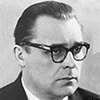 Anatoly E. KiselevHeaded the Institute: 1961 to 1972
Anatoly E. KiselevHeaded the Institute: 1961 to 19721913—04.01.1980 In 1936 A.E. Kiselev graduated with honors from the Smolenks Medical Institute. He is the author of 15 scientific works, 3 monograph, and 14 inventions. He is responsible for organizing the world’s first front-line mobile blood transfusion stations.
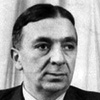 Andrey A. BagdasarovHeaded the Institute: 1932 to 1961
Andrey A. BagdasarovHeaded the Institute: 1932 to 196104[16].02.1897—26.08.1961. Full member of the USSR Academy of Medical Sciences, professor, Chief Hematologist of the USSR Ministry of Health. He was the first to introduce the method of stored blood transfusion into worldwide medical practice.
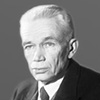 Alexander A. BogomoletsHeaded the Institute: 1928 to 1931
Alexander A. BogomoletsHeaded the Institute: 1928 to 193112[24].05.1881—19.07.1946. Pathophysiologist, Academician (1932) and Vice-President of the USSR Academy of Sciences (1942). He is considered one of the founders of the Institute. Bogomolets developed a unique method for the preservation of donor blood and established the universal donor nature of the first blood group.
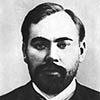 Alexander A. BogdanovHeaded the Institute: 1926-1928
Alexander A. BogdanovHeaded the Institute: 1926-192810[22].08.1873—7.04.1928. Physician, economist, philosopher, politician, natural scientist, founder and head of the world’s first Institute of Blood Transfusion.
NMRC for Hematology Employee Awards Alexander E. Grachev —hematologist of the Department of Chemotherapy of Hematological Diseases, Candidate of Medical Sciences
Alexander E. Grachev —hematologist of the Department of Chemotherapy of Hematological Diseases, Candidate of Medical Sciences Alexander V. Grzhimolovsky —head of the operating unit- doctor-surgeon, Candidate of Medical Sciences
Alexander V. Grzhimolovsky —head of the operating unit- doctor-surgeon, Candidate of Medical Sciences Alexandra A. Akhremtsova —leading specialist of the Donation Development Group of the Department of Blood Transfusion
Alexandra A. Akhremtsova —leading specialist of the Donation Development Group of the Department of Blood Transfusion Alexandra M. Kremenetskaya —hematologist at the Department of Intensive High-dose Hemoblastosis Chemotherapy with Round-the-Clock and Day Hospitals
Alexandra M. Kremenetskaya —hematologist at the Department of Intensive High-dose Hemoblastosis Chemotherapy with Round-the-Clock and Day Hospitals Alina V. Kokhno —Head of the department — hematologist of the Clinical and Diagnostic Department of Hematology and Myeloid Neoplasia, Candidate of Medical Sciences
Alina V. Kokhno —Head of the department — hematologist of the Clinical and Diagnostic Department of Hematology and Myeloid Neoplasia, Candidate of Medical Sciences Alla G. Stremoukhova —doctor of clinical laboratory diagnostics of the Laboratory of Transfusiological Immunohematology
Alla G. Stremoukhova —doctor of clinical laboratory diagnostics of the Laboratory of Transfusiological Immunohematology Alla Yu. Demyanishina —nurse of the Intensive High-dose Hemoblastosis Chemotherapy Department
Alla Yu. Demyanishina —nurse of the Intensive High-dose Hemoblastosis Chemotherapy Department Aminat U. Magomedova —leading researcher of the Division of Lymphoproliferative Diseases, Doctor of Medical Sciences
Aminat U. Magomedova —leading researcher of the Division of Lymphoproliferative Diseases, Doctor of Medical Sciences Anahit L. Melikyan —Head of the department — hematologist of the Department for the Standardization of Treatment Methods of Hematological Diseases
Anahit L. Melikyan —Head of the department — hematologist of the Department for the Standardization of Treatment Methods of Hematological Diseases Anastasia B. Strakhovskaya —nurse-anesthetist of the Department of Anesthesiology and Intensive Care with General Anesthesia Room
Anastasia B. Strakhovskaya —nurse-anesthetist of the Department of Anesthesiology and Intensive Care with General Anesthesia Room Andrey I. Vorobyov —hematologist, transfusiologist, Academician of the Russian Academy of Sciences, Professor, Doctor of Medical Sciences, Director of the NMRC for Hematology from 1987 to 2011.
Andrey I. Vorobyov —hematologist, transfusiologist, Academician of the Russian Academy of Sciences, Professor, Doctor of Medical Sciences, Director of the NMRC for Hematology from 1987 to 2011. Andrey N. Sokolov —senior researcher of the Hemoblastosis Chemotherapy, Hematopoietic Depression and Bone Marrow Transplantation Research Sector, hematologist of the Department Hemoblastosis and Hematopoietic Depressin Chemotherapy with Bone Marrow and Hematopoietic Stem Cell Transplantation Unit, Candidate of Medical Sciences
Andrey N. Sokolov —senior researcher of the Hemoblastosis Chemotherapy, Hematopoietic Depression and Bone Marrow Transplantation Research Sector, hematologist of the Department Hemoblastosis and Hematopoietic Depressin Chemotherapy with Bone Marrow and Hematopoietic Stem Cell Transplantation Unit, Candidate of Medical Sciences Andrey P. Momot —Director of the Altai Branch of the Federal State Budgetary Institution "National Medical Research Center for Hematology" of the Ministry of Health of the Russian Federation, professor, Doctor of Medical Sciences
Andrey P. Momot —Director of the Altai Branch of the Federal State Budgetary Institution "National Medical Research Center for Hematology" of the Ministry of Health of the Russian Federation, professor, Doctor of Medical Sciences Anna A. Kireeva —doctor of ultrasound diagnostics in the Office of Ultrasound and Functional Diagnostics
Anna A. Kireeva —doctor of ultrasound diagnostics in the Office of Ultrasound and Functional Diagnostics Anna A. Sidorova —ward nurse in the Department of Chemotherapy of Lymphatic Tumors with Bone Marrow and Hematopoietic Stem Cell Transplantation Unit with Day HospitalAnahit L. Melikyan — Head of the department — hematologist of the Department for the Standardization of Treatment Methods of Hematological Diseases
Anna A. Sidorova —ward nurse in the Department of Chemotherapy of Lymphatic Tumors with Bone Marrow and Hematopoietic Stem Cell Transplantation Unit with Day HospitalAnahit L. Melikyan — Head of the department — hematologist of the Department for the Standardization of Treatment Methods of Hematological Diseases
For merits in the field of healthcare and many years of conscientious work (Order of the Ministry of Health of the Russian Federation No. 1002-п of 24.11.2016)

For many years of conscientious work and in connection with the celebration of the Day of the Medical Worker (Order of the Ministry of Health of the Russian Federation No. 995-п of 13.06.07)
Andrey N. Sokolov — senior researcher of the Hemoblastosis Chemotherapy, Hematopoietic Depression and Bone Marrow Transplantation Research Sector, hematologist of the Department Hemoblastosis and Hematopoietic Depressin Chemotherapy with Bone Marrow and Hematopoietic Stem Cell Transplantation Unit, Candidate of Medical Sciences
For merits in the field of healthcare and many years of conscientious work (Order of the Ministry of Health of the Russian Federation No. 465-п of 23.05.2014)
Andrey P. Momot — Director of the Altai Branch of the Federal State Budgetary Institution "National Medical Research Center for Hematology" of the Ministry of Health of the Russian Federation, professor, Doctor of Medical Sciences
For services to the development of healthcare, medical science, training of qualified specialists and many years of conscientious work (Decree of the President of the Russian Federation No. 436 of 25.09.2017)
 “Hematology and transfusiology”
“Hematology and transfusiology” Diagnostic algorithms and treatment protocols for diseases of the blood system, vol 1, vol 2
Diagnostic algorithms and treatment protocols for diseases of the blood system, vol 1, vol 2 “Bone marrow transplantation: what does the patient need to know?”
“Bone marrow transplantation: what does the patient need to know?” “National medical research center for hematology today”
“National medical research center for hematology today” “Protocols for the transplantation of allogeneic hematopoietic stem cells”
“Protocols for the transplantation of allogeneic hematopoietic stem cells” diagnostic algorithms and treatment protocols for diseases of the blood system, supplement
diagnostic algorithms and treatment protocols for diseases of the blood system, supplement 04.07.2025Feasibility of Bone Marrow Stroma Transplantation DemonstratedAn article published in the journal Scientific Reports presents the results of an experiment on mice conducted by researchers from the NMRC for Hematology in collaboration with colleagues from the Kurchatov Institute National Research Center. The study demonstrates the fundamental possibility of transplanting bone marrow stroma. This advancement could improve the outcomes of bone marrow transplantation in malignant blood disorders and allow for the treatment of certain genetic diseases.
04.07.2025Feasibility of Bone Marrow Stroma Transplantation DemonstratedAn article published in the journal Scientific Reports presents the results of an experiment on mice conducted by researchers from the NMRC for Hematology in collaboration with colleagues from the Kurchatov Institute National Research Center. The study demonstrates the fundamental possibility of transplanting bone marrow stroma. This advancement could improve the outcomes of bone marrow transplantation in malignant blood disorders and allow for the treatment of certain genetic diseases.
 01.07.2025Proven Pronounced Immune Privileges of Bone Marrow Mesenchymal Stem CellsA team of authors from the NMRC for Hematology of the Ministry of Health of the Russian Federation published an article in the journal Immune Network, demonstrating pronounced immune privileges of mesenchymal stem cells (MSCs) in laboratory mice in vivo.
01.07.2025Proven Pronounced Immune Privileges of Bone Marrow Mesenchymal Stem CellsA team of authors from the NMRC for Hematology of the Ministry of Health of the Russian Federation published an article in the journal Immune Network, demonstrating pronounced immune privileges of mesenchymal stem cells (MSCs) in laboratory mice in vivo. 19.06.2025Team from the NMRC for Hematology at EHA-2025The European Hematology Association Congress (EHA) was held in Milan from 12 to 15 June. The event prominently featured scientific research from experts of the NMRC for Hematology of the Ministry of Health of the Russian Federation.
19.06.2025Team from the NMRC for Hematology at EHA-2025The European Hematology Association Congress (EHA) was held in Milan from 12 to 15 June. The event prominently featured scientific research from experts of the NMRC for Hematology of the Ministry of Health of the Russian Federation.
 10.06.2025Team of Doctors from the NMRC for Hematology of the Russian Ministry of Health Becomes Winner of the “Prizvaniye” AwardA team of doctors from the NMRC for Hematology of the Russian Ministry of Health, led by General Director, Doctor of Medical Sciences E.N. Parovichnikova, has won the "Prizvaniye" (“Calling”) Award for the Best Doctors of Russia in the category “For Creating a New Direction in Medicine.”
10.06.2025Team of Doctors from the NMRC for Hematology of the Russian Ministry of Health Becomes Winner of the “Prizvaniye” AwardA team of doctors from the NMRC for Hematology of the Russian Ministry of Health, led by General Director, Doctor of Medical Sciences E.N. Parovichnikova, has won the "Prizvaniye" (“Calling”) Award for the Best Doctors of Russia in the category “For Creating a New Direction in Medicine.”
 06.06.2025128 IVs-And You’re in RemissionIrina Garkavaya participated in the project “I Will Live!” to say “thank you” to donors and support those who are currently battling illness. The mood on the set was created by the cat Armani and kittens Gina and Marquise.
06.06.2025128 IVs-And You’re in RemissionIrina Garkavaya participated in the project “I Will Live!” to say “thank you” to donors and support those who are currently battling illness. The mood on the set was created by the cat Armani and kittens Gina and Marquise. 03.06.2025Press Service of the Year Works at the NMRC for HematologyThe press service of the NMRC for Hematology of the Ministry of Health of the Russian Federation has won the top prize at the “Press Service of the Year” competition with its project “I Will Live!”
03.06.2025Press Service of the Year Works at the NMRC for HematologyThe press service of the NMRC for Hematology of the Ministry of Health of the Russian Federation has won the top prize at the “Press Service of the Year” competition with its project “I Will Live!” 03.06.2025E.N. Parovichnikova Elected Corresponding Member of the Russian Academy of SciencesBy the decision of the general meeting of members of the Russian Academy of Sciences, the General Director of the NMRC for Hematology of the Ministry of Health of the Russian Federation, chief freelance hematology specialist of the Ministry of Health of the Russian Federation, Doctor of Medical Sciences Elena Nikolaevna Parovichnikova, was elected a Corresponding Member of the Russian Academy of Sciences.
03.06.2025E.N. Parovichnikova Elected Corresponding Member of the Russian Academy of SciencesBy the decision of the general meeting of members of the Russian Academy of Sciences, the General Director of the NMRC for Hematology of the Ministry of Health of the Russian Federation, chief freelance hematology specialist of the Ministry of Health of the Russian Federation, Doctor of Medical Sciences Elena Nikolaevna Parovichnikova, was elected a Corresponding Member of the Russian Academy of Sciences.
 26.05.2025Newly Designed Catheter Will Make Heart Surgery SaferEndovascular surgeon, Candidate of Medical Sciences Daniil Gitelzon, has proposed a new catheter design for endovascular heart surgery, which will make these operations safer.
26.05.2025Newly Designed Catheter Will Make Heart Surgery SaferEndovascular surgeon, Candidate of Medical Sciences Daniil Gitelzon, has proposed a new catheter design for endovascular heart surgery, which will make these operations safer.
![]() 19.05.2025Research on Chronic Myeloid Leukemia Presented at Conference in ErfurtAt the European Conference for Researchers on Chronic Myeloid Leukemia (31st EI CML Meeting) in Erfurt, employees of the Clinical and Diagnostic Department of Hematology of Myeloproliferative diseases, A.G. Turkina and E.Y. Chelysheva, presented three oral reports.
19.05.2025Research on Chronic Myeloid Leukemia Presented at Conference in ErfurtAt the European Conference for Researchers on Chronic Myeloid Leukemia (31st EI CML Meeting) in Erfurt, employees of the Clinical and Diagnostic Department of Hematology of Myeloproliferative diseases, A.G. Turkina and E.Y. Chelysheva, presented three oral reports.
 16.05.2025Rinat Karimov: There’s No Need to Demonize CancerDuring his illness, Rinat Karimov, a participant in the Project “I Will Live!”, kept a blog that later became the foundation for an autobiographical book. Thousands of people read his blog. Rinat hopes that he’s done with it for good.
16.05.2025Rinat Karimov: There’s No Need to Demonize CancerDuring his illness, Rinat Karimov, a participant in the Project “I Will Live!”, kept a blog that later became the foundation for an autobiographical book. Thousands of people read his blog. Rinat hopes that he’s done with it for good. Oksana T.8 June 2025Gratitude to the hematologist V.D. LatyshevRead the entire reviewCollapseIn June 2025, my son will graduate from the 11th grade. It makes me very happy that I get to see this event and I would like to thank my doctor Vitaly Latyshev. I got sick when my son was in the second grade, and at that moment I couldn't even dream that I would be by his side for his graduation. For this, I would like to say thank you to my DOCTOR!
Oksana T.8 June 2025Gratitude to the hematologist V.D. LatyshevRead the entire reviewCollapseIn June 2025, my son will graduate from the 11th grade. It makes me very happy that I get to see this event and I would like to thank my doctor Vitaly Latyshev. I got sick when my son was in the second grade, and at that moment I couldn't even dream that I would be by his side for his graduation. For this, I would like to say thank you to my DOCTOR! Olga5 June 2025Gratitude to the hematologists L.G. Gorenkova, V.K. Luchkina and the entire staff of the Department of Hematology and Chemotherapy of Acute Leukemia and LymphomaRead the entire reviewCollapseI would like to say “thank you” from the bottom of my heart, to thank the head of the Department of Hematology and Chemotherapy of Acute Leukemia and Lymphoma, Lilia G. Gorenkova, my attending physician Valeria Konstantinovna Luchkina, as well as the entire staff of the department for their high level of professionalism, humanity, sensitivity, kindness, empathy, and psychological support. Thanks to you, I'm in remission. I wish all employees of the department good health, peace of mind and happiness! I won't get tired of saying, THANK YOU, THANK YOU, THANK YOU!
Olga5 June 2025Gratitude to the hematologists L.G. Gorenkova, V.K. Luchkina and the entire staff of the Department of Hematology and Chemotherapy of Acute Leukemia and LymphomaRead the entire reviewCollapseI would like to say “thank you” from the bottom of my heart, to thank the head of the Department of Hematology and Chemotherapy of Acute Leukemia and Lymphoma, Lilia G. Gorenkova, my attending physician Valeria Konstantinovna Luchkina, as well as the entire staff of the department for their high level of professionalism, humanity, sensitivity, kindness, empathy, and psychological support. Thanks to you, I'm in remission. I wish all employees of the department good health, peace of mind and happiness! I won't get tired of saying, THANK YOU, THANK YOU, THANK YOU! Valentina2 June 2025Gratitude to the head of the department, anesthesiologist-resuscitator G.M. Galstyan and the entire intensive care unitRead the entire reviewCollapseOn 8 May 2025, I was admitted to the intensive care unit in serious condition. I would like to express my sincere gratitude to the head of the intensive care unit, anesthesiologist-resuscitator Gennady M. Galstyan. Thank you for assembling a team of professionals in your department- responsive, empathetic and attentive doctors who clearly fulfill their official duties. During the entire time I was in the department, I did not remain without a doctor's attention for a single minute. I would also like to mention the work of Alexander Mashkov, the intensive care physician on duty. He is a serious doctor, but at the same time he supported me with a good mood and a smile. I would also like to thank the nursing staff: nurses Naira Ivanovna Jamgarova, Irina Yuryevna Suslova and Nikolai Alekseevich Mayorov. Everyone who helped me deserves high praise and appreciation for their work. I can’t remember the last name of everyone, but I would also like to mention nurses Ivan, Natalia and Ekaterina as well as doctor Antonina. They are on their feet every minute, busy with their work all the time: IVs, injections, pills. For them, all patients are equally important. They are able to find contact with everyone and provide psychological support. Thanks for the gentle care and cleanliness of the orderlies: Lyubov Viktorovna Zheleznyakova, Anastasia Nikolaevna Shotina and Tatiana. They'll make up the bed, wash and feed you.
Valentina2 June 2025Gratitude to the head of the department, anesthesiologist-resuscitator G.M. Galstyan and the entire intensive care unitRead the entire reviewCollapseOn 8 May 2025, I was admitted to the intensive care unit in serious condition. I would like to express my sincere gratitude to the head of the intensive care unit, anesthesiologist-resuscitator Gennady M. Galstyan. Thank you for assembling a team of professionals in your department- responsive, empathetic and attentive doctors who clearly fulfill their official duties. During the entire time I was in the department, I did not remain without a doctor's attention for a single minute. I would also like to mention the work of Alexander Mashkov, the intensive care physician on duty. He is a serious doctor, but at the same time he supported me with a good mood and a smile. I would also like to thank the nursing staff: nurses Naira Ivanovna Jamgarova, Irina Yuryevna Suslova and Nikolai Alekseevich Mayorov. Everyone who helped me deserves high praise and appreciation for their work. I can’t remember the last name of everyone, but I would also like to mention nurses Ivan, Natalia and Ekaterina as well as doctor Antonina. They are on their feet every minute, busy with their work all the time: IVs, injections, pills. For them, all patients are equally important. They are able to find contact with everyone and provide psychological support. Thanks for the gentle care and cleanliness of the orderlies: Lyubov Viktorovna Zheleznyakova, Anastasia Nikolaevna Shotina and Tatiana. They'll make up the bed, wash and feed you.
I bow low to you all!
With respect and appreciation,
Valentina Fedorovna Zinenko
 Galina Andreevna Martynyuk31 May 2025Gratitude to the hematologists O.A. Aleshina, L.G. Gorenkova, L.A. Kuzmina, V.K. Lukina, D.A. Mironova, Firuza Abdulgadji-Kizi Omarova, and K.A. AkezhevaRead the entire reviewCollapseI would like to express my sincere gratitude to the department heads of the NMRC for Hematology Olga Alexandrovna Aleshina, Lilia Gamilevna Gorenkova and Larisa Anatolyevna Kuzmina; to hematologists Valeria Konstantinovna Luchkina, Daria Alexandrovna Mironova, Feruza Abdulgadji-Kizi, Ana Ilyinichna, Karina Amerbievna Akezheva and Polina Konstantinovna, for their sensitivity and attention, for caring for their patients, for their high level of professionalism, for their humanity and kind heart, and for everything that they have done for me, namely for saving my life in the face of a relapse. I would also like to wish them further success in their difficult profession for the benefit of all patients in need of treatment, health and happiness! Thank you so much!!!
Galina Andreevna Martynyuk31 May 2025Gratitude to the hematologists O.A. Aleshina, L.G. Gorenkova, L.A. Kuzmina, V.K. Lukina, D.A. Mironova, Firuza Abdulgadji-Kizi Omarova, and K.A. AkezhevaRead the entire reviewCollapseI would like to express my sincere gratitude to the department heads of the NMRC for Hematology Olga Alexandrovna Aleshina, Lilia Gamilevna Gorenkova and Larisa Anatolyevna Kuzmina; to hematologists Valeria Konstantinovna Luchkina, Daria Alexandrovna Mironova, Feruza Abdulgadji-Kizi, Ana Ilyinichna, Karina Amerbievna Akezheva and Polina Konstantinovna, for their sensitivity and attention, for caring for their patients, for their high level of professionalism, for their humanity and kind heart, and for everything that they have done for me, namely for saving my life in the face of a relapse. I would also like to wish them further success in their difficult profession for the benefit of all patients in need of treatment, health and happiness! Thank you so much!!! Georgy26 May 2025Gratitude to the hematologist A.V. LuchkinRead the entire reviewCollapseI would like to sincerely thank you, Anton Vladimirovich Luchkin, from the bottom of my heart for your work. You are a talented doctor from God with golden hands and a warm heart. Being a doctor is your vocation, but you are also a wonderful person- kind, sympathetic and able to empathize with people. You are an excellent specialist who knows your job in and out. You are confident and determined. These are good qualities for a doctor. I wish you good health, prosperity and success in your difficult and noble work. I also wish you many grateful patients.
Georgy26 May 2025Gratitude to the hematologist A.V. LuchkinRead the entire reviewCollapseI would like to sincerely thank you, Anton Vladimirovich Luchkin, from the bottom of my heart for your work. You are a talented doctor from God with golden hands and a warm heart. Being a doctor is your vocation, but you are also a wonderful person- kind, sympathetic and able to empathize with people. You are an excellent specialist who knows your job in and out. You are confident and determined. These are good qualities for a doctor. I wish you good health, prosperity and success in your difficult and noble work. I also wish you many grateful patients. Zhanna Zhiglinskaya20 May 2025Gratitude to the hematologists L.G. Gorenkova and E.O. TerekhovaRead the entire reviewCollapseI would like to wholeheartedly thank the head of the Department of Hematology and Chemotherapy of Acute Leukemia and Lymphoma, Lilia S. Gorenkova as well as my attending physician Elizaveta O. Terekhova for the opportunity to live a full life without pain.
Zhanna Zhiglinskaya20 May 2025Gratitude to the hematologists L.G. Gorenkova and E.O. TerekhovaRead the entire reviewCollapseI would like to wholeheartedly thank the head of the Department of Hematology and Chemotherapy of Acute Leukemia and Lymphoma, Lilia S. Gorenkova as well as my attending physician Elizaveta O. Terekhova for the opportunity to live a full life without pain.
It was thanks to their professionalism that I was given the correct diagnosis, which had been wrong for more than three years. They prescribed the correct treatment, which led to visible results when I had already lost hope. Thank you so much for your hard work. The department has excellent, attentive staff. They never leave a request unanswered and always come to the rescue. Thank you from the bottom of my heart! I wish you prosperity! Olga20 May 2025Gratitude to the hematologist L.G. Gorenkova, resident E.O. Terekhova, and all the staff of the Department of Hematology and Chemotherapy of Acute Leukemia and Lymphoma with Bone Marrow and Hematopoietic Stem Cell Transplantation UnitRead the entire reviewCollapseI was treated at the NMRC for Hematology in the Department of Hematology and Chemotherapy of Acute Leukemia and Lymphoma. I was admitted in very serious condition,
Olga20 May 2025Gratitude to the hematologist L.G. Gorenkova, resident E.O. Terekhova, and all the staff of the Department of Hematology and Chemotherapy of Acute Leukemia and Lymphoma with Bone Marrow and Hematopoietic Stem Cell Transplantation UnitRead the entire reviewCollapseI was treated at the NMRC for Hematology in the Department of Hematology and Chemotherapy of Acute Leukemia and Lymphoma. I was admitted in very serious condition,
with an unspecified diagnosis 4 days before the New Year. Very fast (4 days!) I underwent the necessary tests, received a full clinical diagnosis, and started proper treatment. I have hope for recovery and a positive attitude! Now, I have completed 6 courses of chemotherapy, I am in remission of the disease, and I lead a normal life! I sincerely thank the head of the department, Candidate of Medical Sciences Lilia Gorenkova, for her high level of professionalism, prompt decision-making, mental sensitivity, attentiveness, and excellent organization of the department's staff. Many thanks to my attending physician, resident Elizaveta Olegovna Terekhova, for her professionalism, attentiveness and kindness. Many thanks to the entire staff of the department – doctors, nurses, orderlies for their teamwork, attention to all patients, courtesy, care and warm and sincere atmosphere, which is conducive to recovery. All of the employees of the department are great workers- they work painstakingly, accurately and precisely. I wish all the staff of the department good health, peace of mind, good moods, smiles, and good luck!
With best wishes,
Olga Konstantinovna Myasnikova Galina Karakai13 May 2025Gratitude to the hematologist M.V. Soloviev and all the staff of the Department of Hematology and Chemotherapy of Paraproteinemic Hemoblastoses with BMT and Hematopoietic Stem Cells UnitRead the entire reviewCollapseFrom the bottom of my heart, I would like to sincerely thank Maxim V. Soloviev and all the staff of the department under his leadership for their humanity and professionalism. It is very important to have such strong, reliable support in difficult moments in life. Many thanks to resident Disana Askerovna, all the nurses, and housekeeping for the comfortable and effective treatment.
Galina Karakai13 May 2025Gratitude to the hematologist M.V. Soloviev and all the staff of the Department of Hematology and Chemotherapy of Paraproteinemic Hemoblastoses with BMT and Hematopoietic Stem Cells UnitRead the entire reviewCollapseFrom the bottom of my heart, I would like to sincerely thank Maxim V. Soloviev and all the staff of the department under his leadership for their humanity and professionalism. It is very important to have such strong, reliable support in difficult moments in life. Many thanks to resident Disana Askerovna, all the nurses, and housekeeping for the comfortable and effective treatment. Vitaly5 May 2025Gratitude to hematologists Y.A. Mangasarova E.A. and FastovaRead the entire reviewCollapseI would like to express my sincere gratitude to the head of the department, Yana K. Mangasarova, and my attending hematologist, Ekaterina Fastova, for their highly professional work and individual approach. I was pleasantly surprised by the excellent organization of the appointment and consultation. Your commitment to understanding my problem and offering optimal solutions has been very valuable to me.
Vitaly5 May 2025Gratitude to hematologists Y.A. Mangasarova E.A. and FastovaRead the entire reviewCollapseI would like to express my sincere gratitude to the head of the department, Yana K. Mangasarova, and my attending hematologist, Ekaterina Fastova, for their highly professional work and individual approach. I was pleasantly surprised by the excellent organization of the appointment and consultation. Your commitment to understanding my problem and offering optimal solutions has been very valuable to me.
I also want to thank you for your patience and willingness to answer all my questions. I felt comfortable and confident throughout the entire treatment process. Special thanks to your medical staff — they were always attentive and friendly, which made my visit to the clinic even more enjoyable.
Thank you for your care and support. I am sure that with such professional and responsive doctors, I have every chance of a speedy recovery. Remission of the disease after PET-CT 18.03.2024.
With respect,
Vitaly
05.05.2025
 Alexander Petrenko4 May 2025Gratitude to the hematologists L.Y.Kolosova, T.N. Moiseeva, E.G. Dorokhina and the entire staff of the Clinical and Diagnostic Department of Hematology and Chemotherapy with Day HospitalRead the entire reviewCollapseI would like to express my deep gratitude to the staff of the Clinical and Diagnostic Department of Hematology and Chemotherapy with Day Hospital. In August 2023, I was sent to the NMRC for Hematology for consultation and to receive a treatment regimen with a diagnosis of lymphoid-dominated Hodgkin's nodular lymphoma. At that time, I had stage 4 with damage to almost my entire body (all lymph nodes, liver, spleen, bones, bone marrow) and could only perform daily tasks on my own for no more than two hours before needing a long rest. Even in my bravest dreams, I couldn’t imagine returning to a normal life. My initial appointment was with Lubov Y. Kolosova. After looking at my documents and doing a second blood test (because the indicators were alarming) she took me to see the head of the department Tatyana N. Moiseeva. After looking at me and the documents with the lab results, they said that I was still a young man, although I had a month left until I turned 50, and that there was nothing difficult in the treatment of my disease. They were only afraid of sending me to receive treatment in the regions, because my disease is very rare and regional hospitals are weary of treating it. Nonetheless, they told me they could easily cure me. After clarifying that I had a place to live in Moscow and, if necessary, I could be treated at home, I was taken to a day hospital for treatment. At that moment, I believed their words and I had a timid, cowardly hope for a successful outcome, but given the stage of the disease and the lesions in my body described in the PET/CT results, it was hard to believe. Elena Dorokhina, a strict but professional specialist and a wonderful person, became my attending physician. After 8 courses of chemotherapy, I achieved complete remission of 2 DS points, after which I had another six months of supportive therapy. I completed the supportive therapy at my place of residence in Norilsk. And so, I returned to a full-fledged life without any restrictions and consequences. I undergo regular examinations and each time stable remission is confirmed – a result that I was even afraid to dream about back in 2023. I couldn’t imagine that I would be cured in a day hospital, even in my wildest dreams. I would also like to thank the day hospital girls for their professionalism and empathetic attitude towards patients. In addition to their main duties, they are the best psychological help. They always try to cheer you up and believe that everyone will be cured. This is very important in the treatment of such diseases because patients come in disassembled and in an emotional state close to despair. Therefore, I would like to thank the entire department staff, who work as a well-trained team, and especially my doctor, Elena Dorokhina.
Alexander Petrenko4 May 2025Gratitude to the hematologists L.Y.Kolosova, T.N. Moiseeva, E.G. Dorokhina and the entire staff of the Clinical and Diagnostic Department of Hematology and Chemotherapy with Day HospitalRead the entire reviewCollapseI would like to express my deep gratitude to the staff of the Clinical and Diagnostic Department of Hematology and Chemotherapy with Day Hospital. In August 2023, I was sent to the NMRC for Hematology for consultation and to receive a treatment regimen with a diagnosis of lymphoid-dominated Hodgkin's nodular lymphoma. At that time, I had stage 4 with damage to almost my entire body (all lymph nodes, liver, spleen, bones, bone marrow) and could only perform daily tasks on my own for no more than two hours before needing a long rest. Even in my bravest dreams, I couldn’t imagine returning to a normal life. My initial appointment was with Lubov Y. Kolosova. After looking at my documents and doing a second blood test (because the indicators were alarming) she took me to see the head of the department Tatyana N. Moiseeva. After looking at me and the documents with the lab results, they said that I was still a young man, although I had a month left until I turned 50, and that there was nothing difficult in the treatment of my disease. They were only afraid of sending me to receive treatment in the regions, because my disease is very rare and regional hospitals are weary of treating it. Nonetheless, they told me they could easily cure me. After clarifying that I had a place to live in Moscow and, if necessary, I could be treated at home, I was taken to a day hospital for treatment. At that moment, I believed their words and I had a timid, cowardly hope for a successful outcome, but given the stage of the disease and the lesions in my body described in the PET/CT results, it was hard to believe. Elena Dorokhina, a strict but professional specialist and a wonderful person, became my attending physician. After 8 courses of chemotherapy, I achieved complete remission of 2 DS points, after which I had another six months of supportive therapy. I completed the supportive therapy at my place of residence in Norilsk. And so, I returned to a full-fledged life without any restrictions and consequences. I undergo regular examinations and each time stable remission is confirmed – a result that I was even afraid to dream about back in 2023. I couldn’t imagine that I would be cured in a day hospital, even in my wildest dreams. I would also like to thank the day hospital girls for their professionalism and empathetic attitude towards patients. In addition to their main duties, they are the best psychological help. They always try to cheer you up and believe that everyone will be cured. This is very important in the treatment of such diseases because patients come in disassembled and in an emotional state close to despair. Therefore, I would like to thank the entire department staff, who work as a well-trained team, and especially my doctor, Elena Dorokhina. Anti-corruption
Anti-corruption Helpline of the Ministry of Health of the Russian Federation on Anti-corruption Issues
Helpline of the Ministry of Health of the Russian Federation on Anti-corruption Issues Independent assessment of the quality of conditions for the provision of services by medical organizationsOfficial website of the Federal State Budgetary Institution "NMRC for Hematology" of the Ministry of Health of Russia © 2025Site support - ADDU
Independent assessment of the quality of conditions for the provision of services by medical organizationsOfficial website of the Federal State Budgetary Institution "NMRC for Hematology" of the Ministry of Health of Russia © 2025Site support - ADDUWe use cookies
By staying on this website, you accept the privacy policy and agree to the terms of use of cookie files.
×Agree - Official Information

